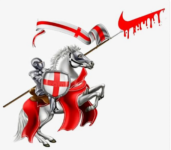Divide and conquer is what it looks like to me.The local authorities must see what these scamming c#nts are actually doing time & time again. Yet they allow this dishonesty to continue.
Therefore is it genuinely possible that our government are actively encouraging a Muslim takeover of the UK?
I keep reading about that but I'd really hope that it isn't true...
You are using an out of date browser. It may not display this or other websites correctly.
You should upgrade or use an alternative browser.
You should upgrade or use an alternative browser.
What's Boiling Your Pi$$ Today?
- Thread starter DD67
- Start date
Don the Don
Legendary Knight
they somewhat remind me of Lemmings

 www.bbc.com
www.bbc.com

60 migrants die in dinghy in Mediterranean, survivors say
Shipwreck survivors tell rescuers they had set sail from Libya a week earlier.
half ton
Legendary Knight
Yeh but Lemmings are cutethey somewhat remind me of Lemmings

60 migrants die in dinghy in Mediterranean, survivors say
Shipwreck survivors tell rescuers they had set sail from Libya a week earlier.www.bbc.com
Tallpaul
Legendary Knight
So, it's not all bad news then. We wont have to feed, house and support that lot.they somewhat remind me of Lemmings

60 migrants die in dinghy in Mediterranean, survivors say
Shipwreck survivors tell rescuers they had set sail from Libya a week earlier.www.bbc.com
I very nearly posted that story in..."What Made You Happy For A Change"...they somewhat remind me of Lemmings

60 migrants die in dinghy in Mediterranean, survivors say
Shipwreck survivors tell rescuers they had set sail from Libya a week earlier.www.bbc.com

Sunak says 'don't mess' with flag on England football kit
Fans, pundits and politicians criticise a new England football shirt featuring a colourful St George's Cross.
Not only are they robbing bastards, look at those prices. I wouldn't be buying one anyway. But look what the woke nonces have done to the cross of St George. They can fuck off. And then they can fuck off some more.
Can you imagine how the Jocks would react to a pink Saltyre? Or the Irish to a purple stripe on their flag. Inclusivity my arse.
Don the Don
Legendary Knight
as long as the great unwashed continue to pay the prices they ask they will keep ripping them off, don't buy them and don't go to the matches "but" they will, as for the change of colour no one gives a crap about our nation they should be beaten, at least the bitch Maggie had balls when BA altered the flag on their aircraft and she stuck her hankie over the model tail plane in disgust
Sunak says 'don't mess' with flag on England football kit
Fans, pundits and politicians criticise a new England football shirt featuring a colourful St George's Cross.www.bbc.co.uk
Not only are they robbing bastards, look at those prices. I wouldn't be buying one anyway. But look what the woke nonces have done to the cross of St George. They can fuck off. And then they can fuck off some more.
Can you imagine how the Jocks would react to a pink Saltyre? Or the Irish to a purple stripe on their flag. Inclusivity my arse.

Sunak says 'don't mess' with flag on England football kit
Fans, pundits and politicians criticise a new England football shirt featuring a colourful St George's Cross.www.bbc.co.uk
Not only are they robbing bastards, look at those prices. I wouldn't be buying one anyway. But look what the woke nonces have done to the cross of St George. They can fuck off. And then they can fuck off some more.
Can you imagine how the Jocks would react to a pink Saltyre? Or the Irish to a purple stripe on their flag. Inclusivity my arse.

Don the Don
Legendary Knight
Not surprised with this result, the law seems to support the shite in society especially if they is black

 www.bbc.com
www.bbc.com

Nottingham attacks: Families call for law change after CPS review
A review following the Nottingham attacks suggests the government should reconsider homicide laws.
Tallpaul
Legendary Knight
Scumbags, the lot of them, the killers, the defence team, the judiciary. I wonder if their own flesh and blood had been murdered if they would come to the same conclusion.Not surprised with this result, the law seems to support the shite in society especially if they is black

Nottingham attacks: Families call for law change after CPS review
A review following the Nottingham attacks suggests the government should reconsider homicide laws.www.bbc.com
Me? I'd shove the cunt through a timberwolf alive and shute the slop into a pig sty.
MartytheMartian
Legendary Knight
You are absolutely right @Tallpaul the judiciary, legal fraternity, politicians and press are all complicit in it. They watch everything from their ivory towers where they aren't directly affected by the filth they are so quick to defend and give an easy ride. Criminals are exciting and attractive to that sort of shite where the ordinary, innocent and victims are beneath contempt to them. Time for a revolution.
Big Sandy
Legendary Knight
"A study funded by the British government to the tune of almost a million pounds claims that William Shakespeare, one of foremost the literary icons in history, has been disproportionately represented and has enabled “white, able-bodied, heterosexual, cisgender male narratives” to dominate theatre.
The study, by academics at the University of Roehampton, was funded by the government’s Arts and Humanities Research Council and essentially claims that Shakespeare is not diverse enough.
The Telegraph reports that the overseer of the study, Andy Kesson, complains that “masculinity and nationalism were crucial motivating factors in the rise of Shakespeare as the arbiter of literary greatness” adding that “[w]e need to be much, much more suspicious of Shakespeare’s place in contemporary theatre”.
There are not enough black and brown disabled queer transgender migrants in Shakespeare’s plays apparently.
As a counter to Shakespeare’s lack of diversity, the researchers are staging a production of a play by John Lyly, a playwright around at the same time as Shakespeare but who wasn’t as successful.
The researchers claim that the Lyly play Galatea offers “an unparalleled affirmative and intersectional demographic, exploring feminist, queer, transgender and migrant lives”.
Given that basically none of those things existed when the play was written, anyone in their right mind would conclude that they are not themes in the play, and instead have been crowbarred into it by the ‘academics’ obsessed with pushing their identity nonsense agenda.
Responding to this complete tripe, author Lionel Shriver noted “In Shakespeare’s day, half the European population was white and male. They didn’t have rainbow flags. Being disabled like Richard III was a matter of character rather than politics, and luckily for them no one had ever coined the linguistic abomination ‘cisgender’.”
Shriver further urged that “Still germane because his themes are timeless, Shakespeare will survive even this dogmatic mangling, and his plays will continue to be enjoyed long after today’s ‘intersectional’ performances have foreshortened into a freakish comical footnote in theatrical history.”
Comedian and author Andrew Doyle also commented “There’s a very good reason why Shakespeare is performed frequently and John Lyly barely at all. Shakespeare was by far the superior playwright. Yet again, ideologues are reducing great art to mere mechanisms for the promotion of an ideology.”
“A production of Galatea would be welcome,” Doyle continued, adding “but given that those behind it are already using anachronistic pseudo-religious terms such as ‘cisgender’ suggests that it will be a tedious affair. They evidently believe what they are doing is radical, but virtually all theatre companies today are obsessed with identity and gender, and so this is likely to be just more conformist and insipid propaganda.”
Conservative MP Jane Stevenson of the government’s culture, media and sport committee, said “I’m not sure reducing Galatea to a celebration of all things woke, or knocking Shakespeare for being pale, male and stale is much more than cultural click-bait.”
“Shakespeare’s works have been translated into 100 languages and clearly still resonate with people all over the world. Love, hate, ambition, loss, jealousy – all universal emotions we all still identify with,” Stevenson further declared.
The study, by academics at the University of Roehampton, was funded by the government’s Arts and Humanities Research Council and essentially claims that Shakespeare is not diverse enough.
The Telegraph reports that the overseer of the study, Andy Kesson, complains that “masculinity and nationalism were crucial motivating factors in the rise of Shakespeare as the arbiter of literary greatness” adding that “[w]e need to be much, much more suspicious of Shakespeare’s place in contemporary theatre”.
There are not enough black and brown disabled queer transgender migrants in Shakespeare’s plays apparently.
As a counter to Shakespeare’s lack of diversity, the researchers are staging a production of a play by John Lyly, a playwright around at the same time as Shakespeare but who wasn’t as successful.
The researchers claim that the Lyly play Galatea offers “an unparalleled affirmative and intersectional demographic, exploring feminist, queer, transgender and migrant lives”.
Given that basically none of those things existed when the play was written, anyone in their right mind would conclude that they are not themes in the play, and instead have been crowbarred into it by the ‘academics’ obsessed with pushing their identity nonsense agenda.
Responding to this complete tripe, author Lionel Shriver noted “In Shakespeare’s day, half the European population was white and male. They didn’t have rainbow flags. Being disabled like Richard III was a matter of character rather than politics, and luckily for them no one had ever coined the linguistic abomination ‘cisgender’.”
Shriver further urged that “Still germane because his themes are timeless, Shakespeare will survive even this dogmatic mangling, and his plays will continue to be enjoyed long after today’s ‘intersectional’ performances have foreshortened into a freakish comical footnote in theatrical history.”
Comedian and author Andrew Doyle also commented “There’s a very good reason why Shakespeare is performed frequently and John Lyly barely at all. Shakespeare was by far the superior playwright. Yet again, ideologues are reducing great art to mere mechanisms for the promotion of an ideology.”
“A production of Galatea would be welcome,” Doyle continued, adding “but given that those behind it are already using anachronistic pseudo-religious terms such as ‘cisgender’ suggests that it will be a tedious affair. They evidently believe what they are doing is radical, but virtually all theatre companies today are obsessed with identity and gender, and so this is likely to be just more conformist and insipid propaganda.”
Conservative MP Jane Stevenson of the government’s culture, media and sport committee, said “I’m not sure reducing Galatea to a celebration of all things woke, or knocking Shakespeare for being pale, male and stale is much more than cultural click-bait.”
“Shakespeare’s works have been translated into 100 languages and clearly still resonate with people all over the world. Love, hate, ambition, loss, jealousy – all universal emotions we all still identify with,” Stevenson further declared.
Big Sandy
Legendary Knight
And ...

Think this is a spoof?
https://www.courts.wa.gov/content/publicupload/eclips/2024%2003%2018%20Supreme%20Court%20Bar%20exam%20will%20no%20longer%20be%20required%20to%20become%20attorney%20in%20Washington%20State.pdf
A bit like the recent school rulings that mathematics is racist and the removal of passing exams to graduate. Yes this is American based but I know from my friend, who was until recently a school inspector, that similar sh*te is going on over here in the UK. Society getting seriously dumbed down.

Think this is a spoof?
https://www.courts.wa.gov/content/publicupload/eclips/2024%2003%2018%20Supreme%20Court%20Bar%20exam%20will%20no%20longer%20be%20required%20to%20become%20attorney%20in%20Washington%20State.pdf
A bit like the recent school rulings that mathematics is racist and the removal of passing exams to graduate. Yes this is American based but I know from my friend, who was until recently a school inspector, that similar sh*te is going on over here in the UK. Society getting seriously dumbed down.
Tallpaul
Legendary Knight
Hopefully, they will be so "dumbed down", that when the revolution finally happens and they get burned, they won't be bright enough to realise until too late.And ...
View attachment 29247
Think this is a spoof?
https://www.courts.wa.gov/content/p...ed to become attorney in Washington State.pdf
A bit like the recent school rulings that mathematics is racist and the removal of passing exams to graduate. Yes this is American based but I know from my friend, who was until recently a school inspector, that similar sh*te is going on over here in the UK. Society getting seriously dumbed down.
Don the Don
Legendary Knight
They also still have MOD contracts, someone, somewhere must be getting some brown envelopes full of cash, money goes to money
Don the Don
Legendary Knight
Share:
